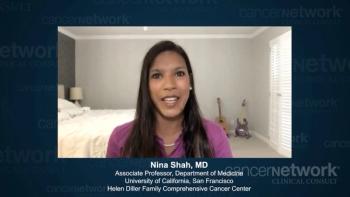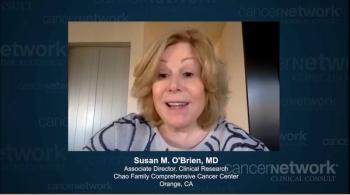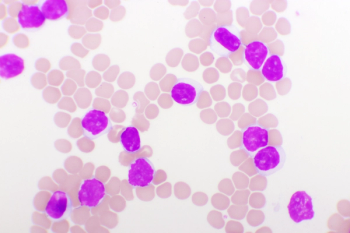
Imaging mass cytometry at the single-cell level showed potential as an immunotherapy response prediction tool in early triple-negative breast cancer.

Your AI-Trained Oncology Knowledge Connection!


Imaging mass cytometry at the single-cell level showed potential as an immunotherapy response prediction tool in early triple-negative breast cancer.

Patients with newly diagnosed glioblastoma who were treated with paxalisib saw positive efficacy and safety results.

Nina Shah, MD, discusses breakthroughs in the treatment of multiple myeloma throughout the preceding year.

A United States indication for duvelisib in previously treated relapsed/refractory follicular lymphoma has been voluntarily withdrawn by developer Secura Bio following an assessment of the drug and subsequent consultation with the FDA.

Susan M. O'Brien, MD, discusses breakthroughs in the treatment of chronic lymphocytic leukemia throughout the preceding year.

The use of alectinib to treat ALK-positive non–small cell lung cancer resulted in better overall survival compared with ceritinib.

The phase 3 ARASENS trial, which assessed the use of darolutamide and docetaxel in patients with metastatic hormone-sensitive prostate cancer, met its primary end point of significantly improved overall survival.

Compared with whole brain radiotherapy alone, the addition of local radiation boost to whole brain radiotherapy improved overall survival and progression-free survival among patients with small cell lung cancer and brain metastases.

The phase 2 MK-6482-004 trial found that belzutifan produced positive response data for patients with renal cell carcinoma and non–renal cell carcinoma neoplasms associated with von Hippel-Lindau disease.

Researchers utilized the European Organization for Research and Treatment of Cancer Quality of Life Questionnaire to examine the prognostic impact on survival of pre-treatment health-related quality of life parameters for patients with newly diagnosed mantle cell lymphoma.

Samilia Obeng-Gyasi discussed the connection between stress and allostatic load and chemotherapy completion in patients with breast cancer.

A study from the Yale Cancer Center potentially introduces a drug design platform to fight drug resistance for patients with HER2-positive breast cancer and ovarian cancer.

The National Comprehensive Cancer Network has reversed its previous ruling in September and instead recommends patients with low-risk prostate cancer receive active surveillance.

The FDA has approved rituximab plus chemotherapy for previously untreated pediatric CD20-postive diffuse large B-cell lymphoma, Burkitt lymphoma, Burkitt-like lymphoma, and mature B-cell acute leukemia following results from the phase 3 Inter-B-NHL Ritux 2010 study.

Patients with chronic lymphocytic leukemia or small lymphocytic leukemia treated with zanubrutinib, obinutuzumab, and venetoclax experienced increased rates of undetectable minimal residual disease in peripheral blood and bone marrow.

Arfolitixorin was granted a fast track designation by the FDA for advanced colorectal cancer based on its potential to address unmet medical needs.

DNA sequencing to detect minimal residual disease and eventual relapse was more accurate than flow cytometry for adult and pediatric patients with acute lymphoblastic leukemia who have been treated with tisagenlecleucel.

Wade Iams, MD, broke down some of the different treatment options, including lurbinectedin and topotecan, for patients with relapsed/refractory small cell lung cancer in the second episode of a 4-part small cell lung cancer podcast series.

A complete response letter has been issued to BeyondSpring Pharmaceuticals for plinabulin plus granulocyte colony-stimulating factor for the prevention of chemotherapy-induced neutropenia.

Panobinostat, which received accelerated approval by the FDA in February 2015 for patients with previously treated multiple myeloma, has had its indication withdrawn in the United States.

A combination of daratumumab, hyaluronidase-fihj, carfilzomib, and dexamethasone has been approved by the FDA for the treatment of relapsed/refractory multiple myeloma.

The FDA has requested more time to review data from 3 pivotal trials featuring pacritinib for the treatment of intermediate or high-risk primary or secondary myelofibrosis with severe thrombocytopenia, thus extending the review period for the agent’s new drug application.

Pediatric patients with KMT2A-rearranged acute myeloid leukemia who were treated with gemtuzumab ozogamicin plus standard chemotherapy experienced improved event-free survival and a reduced relapsed risk.

Patients with bladder cancer reported improvements in physical and social scores following radical cystectomy, although body image and sexual functioning scores decreased.

Patients with high-grade and low-grade brain tumors who carry the BRAF V600E mutation were treated with dabrafenib and trametinib saw clinically meaningful results.

Olaparib, which was granted priority review by the FDA, has been shown to improve invasive disease-free survival for patients with BRCA-mutated HER2-negative high-risk early breast cancer.

Encouraging responses and safety data were observed in the phase 3 SORAYA trial, which analyzed mirvetuximab soravtansine monotherapy for patients with folate receptor α–high platinum-resistant ovarian cancer who previously received bevacizumab.

Patients who were given extended 5-year treatment with letrozole plus 2 to 3 years of tamoxifen experienced an improvement in disease-free survival compared with 2 to 3 years of treatment with letrozole.

Imaging drug pafolacianine was approved by the FDA to detect ovarian cancer lesions in patients during surgery.

Men with localized prostate cancer were most likely to select treatment with radiotherapy over surgery and its associated adverse effects.